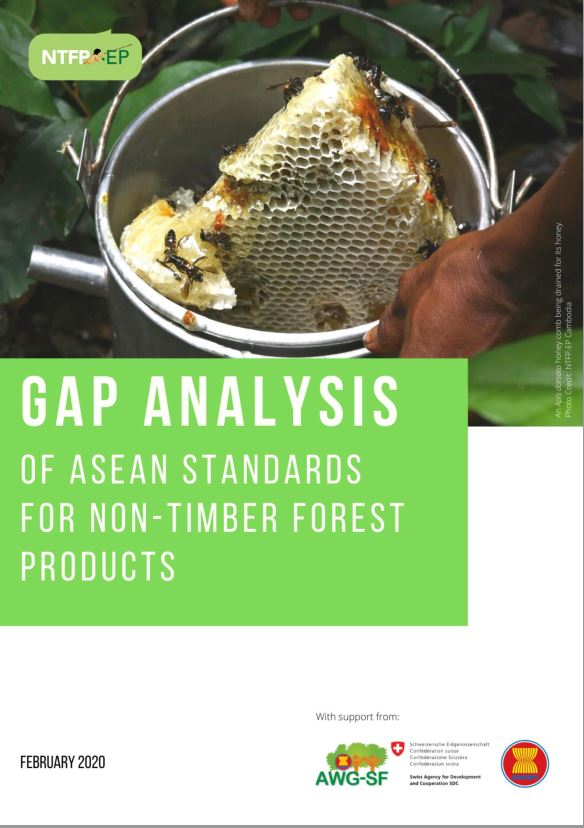This NTFP standards gap analysis was commissioned by the ASEAN Senior Officials in Forestry or ASOF, through the ASEAN Working Group on Social Forestry (AWG-SF). NTFP-EP was tasked to do this study in order to have a basis for future strategic interventions to gain competitiveness in non-timber forest products trade in the region and globally. This study can aide both ASEAN as a regional block and the ASEAN Member States (AMS) in improving their forest products to meet market requirements and ensure the quality of products. The study also seeks to inform social forestry stakeholders of preconditions and plans to standards development in ASEAN.
There is a growing interest in eco labeling and purchasing of green products by national governments (Cambodia, Indonesia), private sector (Vietnam and Indonesia) and important export markets such as the European Union, the United States and Japan. Though some countries have
developed some NTFP standards (Philippines, Vietnam and Indonesia) which can cater to such trends, most trade is based on buyer/ market specifications.
With the exception of Indonesia and Vietnam, the development of NTFP standards does not seem to be a priority in the larger domain of standard development and standard bodies across ASEAN. An opportunity exists however, with the National Standard Bodies established in most of ASEAN
countries. In some countries there are also special technical committees on NTFP development and per specific NTFPs (Indonesia, Philippines). While in other countries there are special technical committees on forest products (Laos) and some specifically on wood (Cambodia, Myanmar). The ASEAN Task Force on Wood based Products (TFWBP) includes bamboo and rattan as products to develop and also presents an entry point for further development and application of NTFP standards at the ASEAN level.
Gaps in standards development are in the availability of knowledgeable and trained personnel to develop and apply NTFP standards, mechanisms and processes. Many well-informed persons are ageing. The availability and financial support for equipment, laboratory facilities and calibration to
test against NTFP standards and the research support necessary for the development of standards is often lacking across the region. Finally, there is a need for compliance monitoring bodies and improved information management systems.
That being said, opportunities for the recognition and application of NTFP standards are visible in programs of other ministries and sectors such as the National Council for Sustainable Development in Cambodia, the Philippine Forest Products Research and Development Institute (Department of Science and Technology) and the Ministry of Science and Technology in Vietnam. AMS can also learn from existing standards and certification systems developed for timber and for organic agriculture as in Myanmar. The presence of government funding (Indonesia, Vietnam) and foreign funding for standards development (ISO, development aid agencies) can facilitate the development of NTFP standards in various ASEAN countries. The existing ASEAN Consultative Committee on Standards and Quality (ACCSQ) is a good body on which to anchor future work on NTFP standards.
Some NTFP products have been included in organic standards (Laos) as “wild products” though these standards are still to be applied. Other alternatives such as standards developed through multi-stakeholder efforts in Participatory Guarantee Systems (PGS) also present opportunities as being tested in trials in Indonesia, Laos and Vietnam. Challenges towards the development of the NTFP sector in ASEAN countries remain. Competitive bidding of commercial NTFP concessions in Myanmar, the quota system for NTFPs in Laos as well as the permitting system for select NTFPs in the Philippines, can be reviewed in the light of developing an enabling environment for facilitating NTFP trade in the region.
In short, the recommendations to address the identified gaps are to develop a multi-stakeholder and phased program in ASEAN on NTFP standards development. Regional cooperation and technical expertise sharing among AMS countries is advisable. ASEAN guidelines on sustainable harvest and
resource management protocols should also be developed as many existing NTFP standards only cover aspects of product quality and not of resource management, despite the fact that markets are seeking proof of sustainable NTFP management. Investments and partnerships should also be mobilized for Community Forestry enterprise awareness raising and capacity building in this field. Financial support for testing facilities is also important. The exploration and recognition of alternative standards and certification schemes is wise, especially as they become more acceptable by certain markets. Finally, streamlining permitting and exporting processes is important to improve NTFP trade viability.




